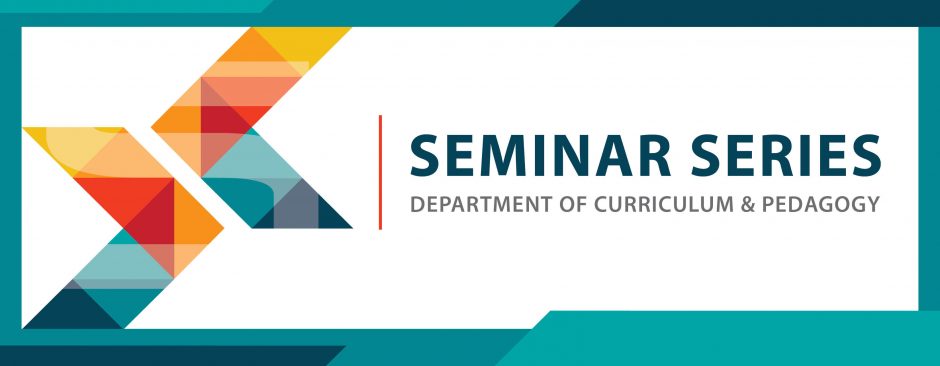
Mr. Mitchell McLarnon, Ms. Layal Shuman, Dr. Pauline Sameshima, Dr. Kathryn Ricketts, and Dr. Sean Wiebe
Friday, November 30, 2018 | 12:30 – 2:00 pm | Scarfe 1130
Faculty Host: Dr. Rita Irwin
View the Seminar Poster
Abstract
The Council of Ministers of Education, Canada (CMEC) focus on creativity and innovation for driving economic advancement and diversification exerts pressure on teachers who aren’t necessarily prepared to put on entrepreneurship hats and transform classrooms into start-up hubs. Moreover, incidents such as the Ontario government’s decision to revoke the sex education curriculum is a reminder of how politicians use education for political gain without considering learners. In political and economic disputes, teachers are left to navigate the chaos.
Our Pan-Canadian SSHRC funded project to think about teacher identity for the Creative Economy (CE) is a response to findings that suggest that much of education focuses on skills training that rarely stimulates creativity (Digital Economy Research Team, 2011-2014). Through a longitudinal comparative case study approach, we have been investigating how creative pedagogies develop through the multiple interconnections among artmaking, research and design thinking; and how developing an ethos to position teachers as a/r/tographers can establish more measurable and immediate pathways for teacher and student contributions to the CE. To build the ethos, we have been training teachers in a/r/tography and design thinking strategies, as well as supporting artistic ways of being and thinking within their school communities.
Finally, words such as innovation and creative disruption infiltrate classrooms without much opportunities for pedagogic critique. In this presentation, we hope to engage with the audience in precisely such conversation. While education technology companies may present (expensive) temporal fixes to rising expectations of teachers preparing students to compete in the 21st-century global economy, the arts and humanities once again draw attention to their value in nurturing creativity and critical capabilities. Together, with faculty and students, we hope to raise difficult questions and reflect on our research collaboration over the past two years. If Silicon Valley terminology burdens many art teachers, what would be the experiences of teachers outside the arts who do not even identify as creative; artist, writer; designer? How can the arts support the making of creative, pedagogical identities? Additionally, how can the arts and humanities creatively resist the scapegoating of teachers who are (once again) made responsible for teaching solely for economic viability?
Short Bios
Sean Wiebe, an Associate Professor of Education at the University of Prince Edward Island, has been the principal investigator on four Canadian Social Sciences and Humanities Research Council funded projects exploring the intersections of creativity, the creative economy, language and literacies, and arts informed inquiries.
Kathryn Ricketts, an Associate Professor of Arts Education at the University of Regina is the founder of Art EDU HUBS, which aim at creating forums for cutting diagonally across the practices of Artists/Teachers and Art Agents with the objective of creating a lateral forum of exchange in order to foster a rich and dynamic container whereby practices and knowledge is shared and developed.
Pauline Sameshima, Professor and Canada Research Chair in Arts Integrated Research at Lakehead University, uses multimodal research processes to study creative capacity, relationality, and community health.
Mitchell McLarnon is a doctoral candidate, gardener and sessional lecturer at McGill University. His research interests include social justice, homelessness, participatory and arts-based educational research methodologies, garden-based learning and environmental education.
Layal Shuman is a PhD candidate at McGill University and a lecturer at Ryerson University. Her research addresses creativity in education and how design learning offers new ways of thinking about curriculum and education.